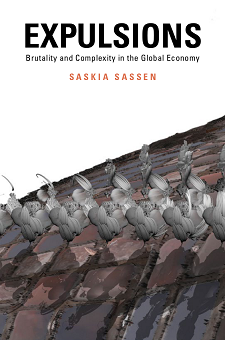Sassen, S. (2014) “European economy’s invisible transformation: expulsions and predatory capitalism“, Eurocrisis in the Press, LSE EUROPP, 03 Ιουλίου.
Parts of our economies, societies, and states in Europe are being stripped bare by an extreme form of predatory capitalism. And this stripping can coexist with growth in much of our economies. The majority of workers and economic operations keep functioning, even if at reduced levels.
The language of low growth, unemployment, inequality, poverty, is not enough to capture what is going on in the current phase of capitalist political economies. All of these are present, but then they always have been part of capitalism. There is a specific difference I want to capture: something far more brutal and acute that we cannot capture with the usual language. Further, I want to argue that these dynamics are not only hitting Greece, Spain and Portugal, but in fact are present throughout Europe, including Germany and the much admired Scandinavian countries.
I think of this stripping bare as systemic expulsions, and in being expelled these extreme conditions become invisible to our standard measures and categories. The unemployed who lose everything—jobs, homes, medical insurance—easily fall off the edge of what is defined as ‘the economy’ and counted as such. So do small shop and factory owners who lose everything and commit suicide. And so do the weakened and ill newly poor who can no longer access basic medical services. All are stripped from what gets measured as ‘the economy.’
This process of expulsion entails extreme conditions that begin at the edges of systems, in micro-settings. This is important, because much of this sharp shift I am seeking to capture is still invisible to the statistician. It is also often invisible to the passerby—the impoverished middle classes may still be living in their same nice houses, with their losses hidden behind neat facades. Increasingly these households have sold most of their valuables to afford payments, have started to sell their basics, including furniture, and are doubling up with grown-up children. Modest increases in employment growth are not enough to eliminate this shrinking. These are radical eliminations of types of workers, types of economies, and types of places that are no longer needed or worth the costs.
Σχετικές αναρτήσεις:
- Koutsogeorgopoulou, V., Matsaganis, M., Leventi, Schneider, J. D. (2013) “Fairly Sharing the Social Impact of the Crisis in Greece“, OECD, Paris.
- International Monetary Fund (2014) “Fiscal Policy and Income Inequality“, IMF Policy Paper, 23 Ιανουάριος.
- European Commission (2014) “Employment and Social Developments in Europe“, 2013, Βρυξέλλες.




